Bible History – C. 2850-2830 BC
Before our first battle analysis but I realized I had to mention this most important topic of how the nations began. This is the Table of Nations in Genesis 10. As we are especially focused on a Biblical geo-political analysis, it is vital that we speak of this.
Professor William Albright said that Genesis 10 “stands absolutely alone in ancient literature, without a remote parallel, even among the Greeks, where we find the closest approach to a distribution of peoples in genealogical framework […] the Table of Nations remains an astonishingly accurate document.”
WHY DO WE WORSHIP a JEWISH GOD?
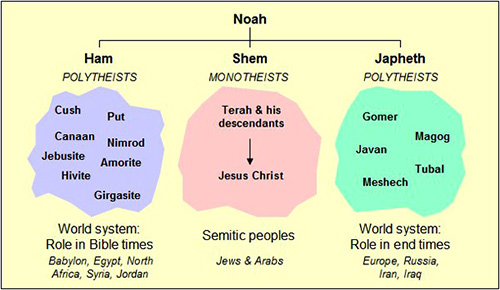
Many of us have wondered why we worship a Jewish God. Indeed, Jesus was Jewish, and we know of his roots. But we ask, what of the other nations. Didn’t God care for them? The answer is yes, of course, God cares. But God chose to reveal himself in our dimension, in our time, on our planet. God also functions through the family, which He established. Therefore God decided to present himself and act in partnership with the one people that would worship and follow Him. These were the Hebrews (descendants of Eber, son of Shelach, son of Arphaxad, son Shem, son of Noah).
WHAT of the OTHER NATIONS?
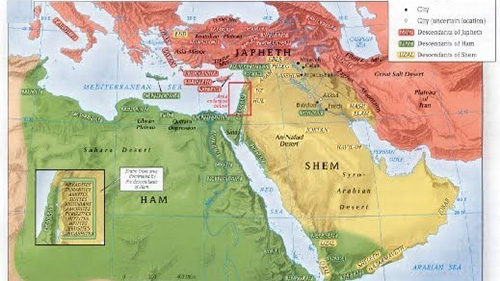
God scattered the remaining ethnic groups after Babel. Nevertheless, He will restore all nations to Himself at the end of time. Here is a brief account of their origins.
The following is a mixture of biblical accounts, historical record and archaeological evidence. When these three are in agreement theologians can present the following history of the birth of our present civilization.
FIRST SETTLEMENTS
How the nations began can be explained by Noah’s three sons Shem, Ham and Japheth. They were the ancestors of the today’s population.
Noah’s Ark landed on Mount Ararat in Turkey, previously known as Anatolia, or Asia Minor. All serious archaeological evidence points to this site being the origin of the second civilization after the flood.
- Josephus states that in AD 100 there were still remnants of the ark there.
- Genesis mentions that Noah planted a vineyard soon after they began settling in the region. The oldest wine in the world is the Chateau Arratta from the region of Miyandoab by Ararat.
- Catal Huyuk is the first known settlement pointed out by archaeologists. The site is also located in that region. The first known astrological observatory and the first known temple have also been excavated there.
SHEM – how the nations began in ASIA
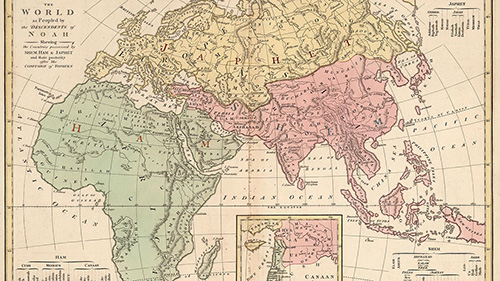
Name: Shem: Shemites = Semites
Peoples: Semites; Jews and Arabs.
Belief: Monotheistic. They were the only people to believe in one God. Jesus would descend from Shem and this is why God would later protect a group of its peoples, the Hebrews , to safeguard the Messiah’s base.
Land: Sumeria, Arabia, parts of the Middle East, parts of Europe.
Children: Elam, Asshur, Arphaxad, Lud, Aram.
Elam
Name: “eternity”
Children: Shushan, Machul and Harmon.
Groups: Elamites (2700-539 BC) – Founders of Sumaria; moved to Iran. Persians – Iran.
Subgroups:
Pol (moved northwest to become Poland); Chroasi (how the nations began in the Balkans to become Croatia); Serbi moved to the Balkans to become Serbia.
————————————–
Asshur
Name: “a step” or “strong” Ashur was deified and worshiped as a God by many cultures.
Children: Mirus and Mokil Lived in Nineve.
Groups: Assyrians/Northern Iraqis
The Assyrians were known as the master race. Their kings called Shar Kishshati were the forerunners of other lines of rulers such as the Shas, Caesars, Tzars and Kaisers.
The Hindus did not like the Assyrian worshippers of Ashur. The Cast System in India may have developed out of the division of the lighter skinned Assyrian master race and the darker skinned Indians.
The Persians on the other hand were amicable with the Assyrians.
The Assyrians migrated to Germany and, in 612 BC, when their empire was defeated they assimilated with the surrounding peoples. The Romans would call them Germani (the “genuine ones”). They move also into Turkey. They are also listed among the Gauls in France.
In AD 4oo the Assyrians are part of the invasion of Europe by the Vandals, Alans, Saxons and Allemandi. Moving into Germany they produce the Franks (French). The Franci and Saxons invade Gaul and later the Anglo-Saxons invade Britain.
Notables: King Enmerkar is believed to be King Nimrod in Genesis. He gathered materials to build the ziggurat which was to become the Tower of Babel which was the Bible episode of how the nations began and then dispersed.
————————————–
Arphaxad
Name: “I shall fail”
Children: Shelach – produced Eber, who became he father of the Hebrews. Other children were Anar and Ashcol.
Groups: Chaldeans/Southern Iraqis, Hebrews/Israelis/Jews, Arabians/Bedouins, Moabites/Jordanians/Palestinians
Arphaxad begot Salah, and Salah begot Eber. To Eber were born two sons: the name of one was Peleg,
Notables: Abraham, Judah and remaining genealogy of the Bible until Jesus.
————————————–
Lud
Name: “strife” Known for their white skin and their skill as archers.
Children: Pethor and Bizayon
Groups: Ludim, Lubim, Ludians, Ludu, Lydians, Chubs, other related groups in Asia Minor and North Africa.
How the nations began in the Mediterranean area: Lud migrated to North Italy with the Etruscans which would found the Roman Empire.
————————————–
Aram
Name: “exalted”
Children:
Uz – Syria and Italy
Chul – Armenia (732 BC); descendants, the Halani, were handsome, tall and blonde.
Gather – Bactreans; Goths (2000 BC); moved to Black Sea and Baltic (100 BC – AD 100); West branch were Visigoths which steeled into the Iberian Peninsula; the East branch settled in Austria and Scandinavia from where the Vikings originated.
Mash – lived near the Elamites in Iran, moved to southern Russia and Poland.
Groups: Aramaeans/Syrians, Lebanese and remnant groups throughout Asia, the Middle East, and North Africa.
Origin of the Aramaeic language that Jesus spoke. They were taken captive by Assyrians and moved to Iran.
Notables: Rebekah, wife of Isaac.
————————————–
HAM – how the nations began in AFRICA
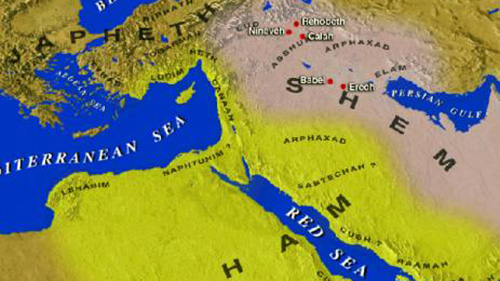
Name: Also Kham. Literal meanings are hot, burnt or dark
Peoples: father of the Mongoloid and Negroid races – Hamites.
Belief: polytheistic
Land: Babylon, Canaan, Egypt, North Africa, Syria, Jordan. C-hem-ia: country of Ham. K-hem-et: ancient Egypt.
——————————————————————
Cush
Name: “black”; also Kos, Kosh, Kushu
Children:
Seba – India (Seba: Sibae/Sheva Hindu god).
Havilah – Avalitae/Avalis – East Africa
Sabta – Sibathens/Sabs – Somalis
Raama.
Satecha.
Other groups: There were the African Cushites and the Asian Cushites. Among other descendants were Nubians, Ethiopians, Sudanese, Ghanaians, Africans, Bushmen, Pygmies, Australian Aborignies, New Guineans.
Notables: King Nimrod/Enmerkar who built the Tower of Babel.
——————————————————————
Mizraim
Name: “double straits”, also Misraim, Mitzraim, Mizraite, Mitsrayim
Children:
Ludim, Anamin, Lehabim, Naphutuhim, Pathrusim, Casluhim, and Caphtorim.
They ended up in Egypt and Libya.
The Caphtorim ended up in Crete and Greece.
Notables: the first Egyptian dynasty was the Horus Kings. Horus was also the falcon god of the Sun. There is an ancient account of tis kingdom being born out of the water with a symbol of the falcon which had a reed in its mouth just as the biblical account of the dove carrying an olive branch.
——————————————————————
Phut
Name: “a bow” also Putaya, Putiya, Punt, Puta, Put
Children: Gebul, Hadan, Benah and Adan.
Groups: Libyans, Cyrenacians, Tunisians, Berbers, Somalians, North Africans.
——————————————————————
Canaan
Name: “down low”; also Canaanites, Cana, Chna, Chanani, Chanana, Canaana, Kana, Kenaanah, Kena’ani.
Children: Zidon, Heth, Amori, Gergashi, Hivi, Arkee, Seni, Arodi, Zimodi and Chamothi.
They settled in the Middle East and Turkey.
Notable Groups:
Hittites (1700-1180 BC) – were to have one of the first major kingdoms, best known for confronting the Egyptians.
Sinites – worshiped the moon; settled in Arabia where they worshiped an ancestor who gave them the law. Moses would come later to Sinai and receive the real law (from God, rather than ancestors). The Sinites are also the ancestors of the Chinese (“China” = “Father Sin) in 2600 BC.
Other groups: were the Sidonites, Jebusites, Amorites, Girgashites, Hivites, Arkites, Arvadites, Zemarites, Hamathites.
Sub-groups: From the Sinites came the Mongols, Chinese, Japanese, Asians, Malaysians, Amerindians, Eskimos, Polynesians, Pacific Islanders.
——————————————————————
JAPHETH – how the nations began in EUROPE
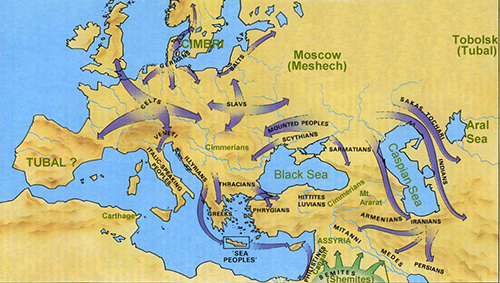
Name: Also Diphath. Literal meanings are opened, enlarged, fair or light. Pra-Japati (Hindu for “Father Japheth”). Djapatishita (Sanskrit for “chief of the race”).
The Hindu accounts that lead to the belief of Karma which is based on the distinction between the inferior dark skinned Ham, whose father was cursed for laughing at his father’s drunkenness and the superior white skinned Japheth. This is the basis of the how the nations began in what is known today as the Indian Subcontinent leading to the Hindu Caste System.
Peoples: Father of the Caucasoid/Indo-Europoid, Indo-European, Indo-Germanic, or Indo-Aryan races – Japhethites).
Belief: polytheistic
Land: India, Europe, Russia, Iran, Iraq.
———————————————————————–
Gomer
Name: “complete”; also Gamir, Gommer, Gomeri, Gomeria, Gomery, Goth, Guth, Gutar, Götar.
Children:
Ashkenaz – spread from Lake Ascenia in Turkey to germany, Scandinavia, Russia, Thailand, Buthan, Nepal, Laos, Vietnam, Malasya, Indonesia, Mongolia, China and Japan.
Riphath – Russia, Finland, Hungary.
Togarmah – Armenia, Turkistan.
Groups: Galatians (Turkey) or Gomerryans which were defeated in 677 BC and moved to Crimea in the Black Sea. Others moved west to become the Gauls (France) and Celtae (Britain).
Sub-groups: Britons (came after fall of Troy and ruled Thanes area 1104-1181), Anglo-Saxons (came from Angeln and Saxony in AD 450s), Scots (came from Ireland AD 498) English, Cornish, Irish, Welsh, Franks (French), Caledonians, Picts, Milesians, Umbrians, Helvetians, Ostrogoths, Visigoths, Goths, Vandals, Scandinavians, Jutes, Teutons, Burgundians, Alemanni, Armenians, Germans, Belgians, Dutch, Luxembourgers, Liechensteiners, Austrians, Swiss.
———————————————————————–
Javan
Name: “miry”; also Ionians, Yawani, Yauna, Yaman, Yavanu, Yavanna, Jevanim.
Children:
Elisha – tribe of Milyaes went east to Himalayas, Malasya and islands including Polynesia.
Kittim – Cyprus and Macedonia.
Dodanim – Rhodes and Dardanelles (Troy)
Tarshish – Cartage, Phoenecian, Iberian Peninsula.
Groups: Grecians/Greeks (2000-1200 BC), Elysians, Spartans, Dorians, Britons, Aeolians, Achaeans, Myceneans, Macedonians, Carthaginians, Cyprians, Cretans, Basques, Latins, Venetians, Sicanians, Italics, Romans, Valentians, Sicilians, Italians, Spaniards, Portuguese.
———————————————————————–
Magog
Name: “land of God”; also Gog, Gogh, Magug, Magogae, Mugogh, Mat Gugi, Gugu.
Children: Elichanaf, Lubal, Baath, Jobhath and Fathochta.
Groups:
Scythians (moved to the north of the Caucus and spread out), Mongolians, Aleuts, Eskimos, Ameroindians, Scots, Irish, Russians, Belarusians, Ukrainians, Hungarians, Finns, Lapps, Estonians, Siberians, Yugoslavians, Croatians, Bosnians, Montenegrins, Serbians, Slovenians, Slovakians, Bulgarians, Poles, Czechs.
———————————————————————–
Madai
Name: “middle land”; also Mada, Amada, Madae, Madea, Manda, Maday, Media, Madaean, Mata, Matiene, Mitani, Mitanni, Megala.
Children: Achon, Zeelo, Chazoni and Lotalso.
Moved into the Black Sea, Danube, Ukraine, Persia and India.
Groups: Medes (Medo-Persian Empire), Aryans, Persians, Parsa, Parsees, Achaemenians, Manneans, Caspians, Kassites, Iranians, Kurds, Turks, East Indians, Pathans, Hazaras, Afghanistan, Pakistan, Azerbaijan, Khazachstan, Turkmenistan, Uzbekistan, Tajikstan and Kyrgyzstan.
———————————————————————–
Tubal
Name: “brought”; also Tabal, Tabali, Tubalu, Tbilisi, Tibarenoi, Tibareni, Tibar, Tibor, Sabir, Sapir, Sabarda, Subar, Subartu, Thobal, Thobel, Tobol, Tobolsk.
Children: Ariphi, Kesed and Taari
Moved into the Hittite Empire territory when it collapsed in 1200 BC.
Groups: Georgians, Albanians, Bulgars.
———————————————————————–
Meshech
Name: “drawing out”; also Moskva, Moscovy, Moscow.
Children: Dedon, Zaron and Shebashnialso.
Moved to North Armenia, Black Sea and Moscow area (300s BC).
Groups: Muscovites, Latvians, Lithuanians, Romanians.
———————————————————————–
Tiras
Name: “desire”; also Tiracian, Thracian, Thirasian, Thuras, Troas, Tros, Troia, Troi, Troy.
Children: Benib, Gera, Lupirion and Gilak.
Moved into Crete, Macedonia, Yuguslavia and Americas (many of the North American Indian tribes derive their names from Aegean island names).
Groups: Thracians, Trojans, Mayans, Etruscans, Pelasgians, Scandinavians, Varangians, Vikings, Swedes, Norwegians, Danes, Icelandics.
 PRAISE & WORSHIP
PRAISE & WORSHIP
My Lord and my God: You have caused yourt creation to flourish even in the city where food is not grown. Shurely your Name shall endure forever, and forever it shall be celebrated. Multitudes are blessed in you daily, and people of all nations call you blessed. Lord God: God of Israel and of the blood-washed: The wondrous things you do, no one else can. Blessed is your glorious Name for ever. The whole Eaerth is filled with your glory, My Lord, and it is marvellous. 1
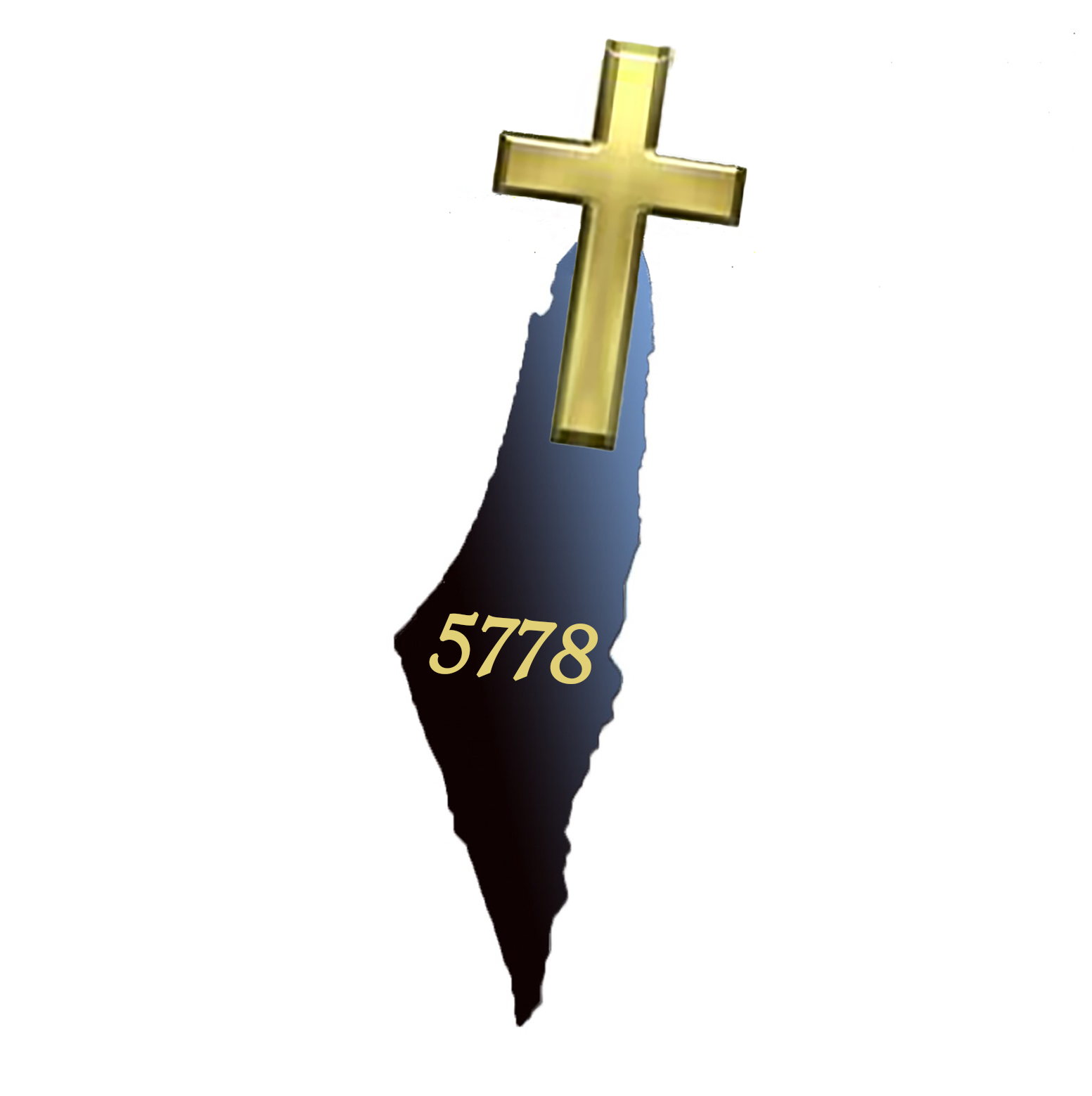
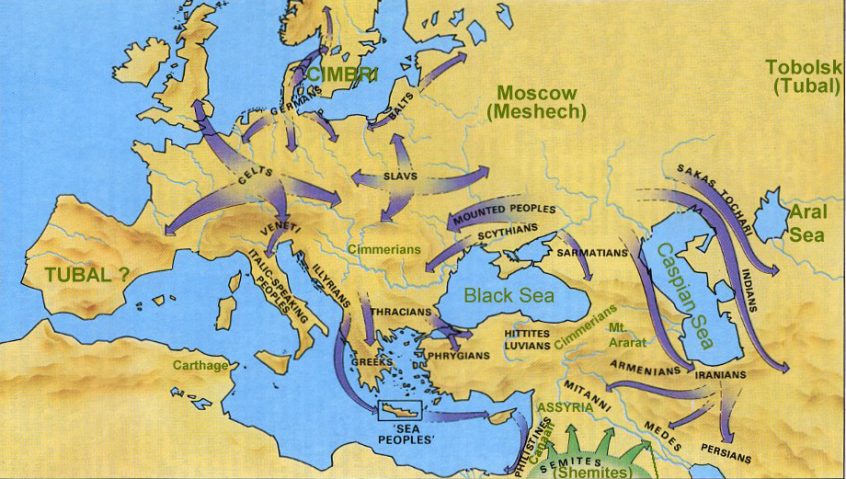
4 Comments on “How Nations Began – Table of Nations – Dispersement of Nations”
Rubbish
Perhaps. I'd like to consider other points of view if they are explained/expanded.
Pingback: Battle of SIDDIM - Gods War Plan | Best Bible Battles & War Strategy
Pingback: The Beginning history of the World; setting up the stage for Bible battles